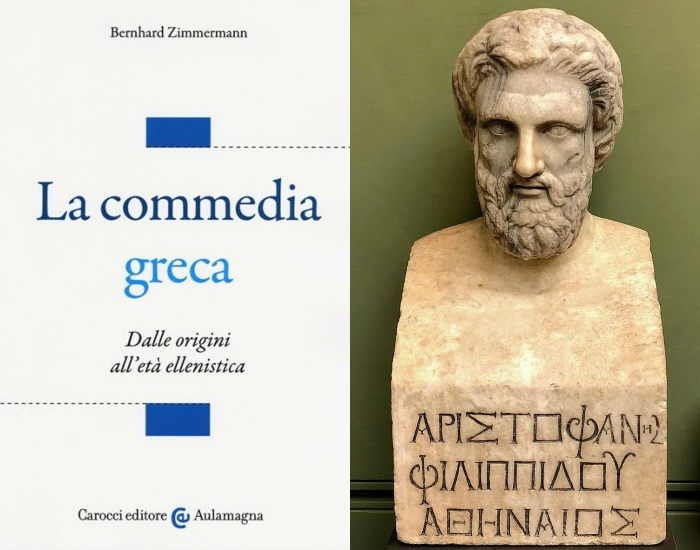Aristophanes’ ingenious “Lysistrata method” to impose peace

The Notepad of Michael the Great
In the years in which Aristophanes (about 450-385 BC) was working on the comedy “Lysistrata”, Athens had already been engaged for twenty years in the Peloponnesian war against Sparta (431-404 BC). His expedition against Syracuse (415-413 BC) had resulted in a military disaster; the fleet, the basis of his power, had been destroyed. The college of the ten "pròbuli" ("preparers") was then created, a control commission which had to decide in advance on all the requests presented by the assembly. It is the premise of the "oligarchic coup" (411 BC) that gives rise to the so-called "government of the four hundred", followed shortly after by a more moderate oligarchic government in which power is entrusted to a "council of five thousand".
Precisely in that year Aristophanes brought Lysistrata to the Lenee (religious festivals in honor of Dionysus, which were celebrated in the sacred area of the Leneus), a comedy in which political reflections and wildest comedy intertwine in an unsurpassed way. The plot of the comedy stems from the idea that the only culprits of the Athens catastrophe are the males: with their bellicose madness they have ruined the polis. To remedy the damage, the Greek women, gathered by Lysistrata ("the one who dissolves the armies"), decide to deny their husbands sexual relations to induce them to reason: a theme that allows numerous jokes and obscene jokes, especially in the representation of the sexual needs of men, victims of the strike.
The action of the comedy develops on two levels, of great artistic effectiveness. The actors are the young women, lined up around Lysistrata, and the male soldiers full of sexual desire. The choir is instead made up of the old and the old. In the unusual division of the choir into two groups, Aristophanes thus tries to make visible the split that has opened up in Athenian society ( see Bernhard Zimmermann, "The Greek comedy. From the origins to the Hellenistic age", Carocci, 2016).
To ensure the success of her plan, that is to force men to cease all forms of belligerence with a sexual strike, Lysistrata unexpectedly occupies the Acropolis to deprive men of the financial means kept there, necessary for the continuation of the conflict. At this point, complaining of the ailments of age and nostalgically remembering the glorious past, inveighing against the impudence of women, the choir of the elderly appears, who wants to burn women on the rock. But the old women, who make up the other half of the choir, are quick to lend a hand to their allies on the Acropolis.
The old women want two things, and therefore they invoke the help of the goddess of the city, Athena: to free the citizens from the war against the Spartans and to reconcile the internal conflicts. The prayer recited by the women is clear: the end of hostilities against external enemies will be possible only if there is first a reconciliation between the different internal factions. Lysistrata is the official voice of women: she defends her plan in front of a representative of the polis, a probulus; it holds women together, who risk becoming vulnerable at the sight of their husbands; and, finally, he urges the young Mirrine to seduce her husband Cinesia, but without satisfying him sexually.
Not only in Athens, but also among the enemies the effect of forced abstinence is felt. A Spartan herald, unsuccessfully trying to hide his erect phallus under his cloak, runs into a pritano (one of the fifty councilors who held the city government for a tenth part of the year) who was in the same condition. Forced by their uncontrollable excitement, unable to think clearly, they agree to make peace immediately, so as to obtain, with the dissolution of the "tensions" of foreign policy, also the dissolution of their most intimate "tensions". The negotiations are concluded all the more quickly because Lysistrata puts the “Reconciliation” under the nose of the Athenian and Spartan negotiators, in the form of a naked girl.
Yet, before an official truce can be reached, tensions within the city must be quelled, or, in theatrical fiction, a reconciliation must be achieved and, therefore, a reunification of the two semicores. The latter is acortly prepared by Aristophanes in the individual choral songs. In the parabasis (interlude of the comedy), however, men still let themselves go to swaggering memories of their splendid deeds, accomplished for the good of Athens.
Despite the contradiction between their staggering gait and the grandiosity of their statements, the old do not give the impression of comic figures, but rather arouse in the viewer a smile due to sympathy. Like the old men, the old ones also boast of having done something important for the city, in the role of mothers and priestesses. And it is the elderly who initiate reconciliation. Despite the harsh words and rumblings of the coryphaeum, the coryphea of the female semicore approaches him, lovingly puts a tunic on him and removes a mosquito from his eye. Moved, even the old corifeo shakes hands with the woman.
This is a machine translation from Italian language of a post published on Start Magazine at the URL https://www.startmag.it/mondo/il-geniale-metodo-lisistrata-di-aristofane-per-imporre-la-pace/ on Sat, 28 May 2022 05:04:15 +0000.
